Fatoumatta K Jallow
Mr. Ansuman Camara, the Programme Officer of Activista, has at a recent forum on democracy outlined the important role young people continue to play in Gambia’s ongoing democratization process.
He said a lot of things are happening in the new Gambia; that it is the duty of young people to take Gambia in the direction they voted for.
“Young people constitute more than 50% of the population and whatever happens will bounce back on us. When the Gambia is doomed, we will suffer the most. In most of the countries in Africa when there is war it is always the young people, children and women who suffer,’’ he said.
Activista-The Gambia, a global youth network of Action Aid International with funding from the National Endowment for Democracy (NED), organized a three-day training at the Gambia Pastoral Institute along the Kairaba Avenue.
The project “Enhancing democratization processes through youth leadership and participation,’’ drew participants from Banjul and the Kanifing Municipality. It is expected after the training, that participants will serve as advocates of democracy in their various regions and also make them understand their civic rights as citizens of this country.
Mr. Alagie Nyang, The National Coordinator of Activista the Gambia, said the project which is being implemented by Activista aims to increase youth participation and involvement in decision making processes in the country.
“If you look into our current status, you realize that the involvement and participation of young people in decision making, is not desirable because our involvement to a great extent, is lacking. That is why this project aims to increase that participation and involvement”, said the Activista National Coordinator.
“We faced a lot of challenges from the inception and that is because the democratization process is gradual and has to deal with the understanding of the people on their roles and responsibilities in ensuring that democracy is strengthened and consolidated in the country”, he said.
He added that the training began with fifty young people within Banjul and Kanifing on good governance and democracy and will continue in other regions of the country.
“When we say democracy, it is not based on the benevolence of the leadership, not based on the fact that the leaders are very kind and lenient. It is the people who make sure they keep a constant check on the executive to remind them of their responsibilities within the confinement of the constitution. That is what makes them stick to the constitution and this is what is going to consolidate and constitute democracy in the country. If you all relax and say it is a new government, by the time we will realize the space, we are encircled again”, said Activista National Coordinator.
Mr. Omar Danso, the Project Coordinator, said the project is geared towards enhancing young people’s understanding of democracy and their participation in decision making processes.
“We understand that in the country prior to the impasse, politics was seen as thing for the elderly. Youths were always excluded because young people feel that politics does not concern them. After the impasse, we realize that there are many young people who understand the reason why they should participate in politics”, said the project coordinator. For his part, Mr. Dawda Samba, the Vice Chairperson of Activista Board, said it is high time young people speak for themselves and do things that affect their lives.
“The Gambia is at a crucial and fundamental stage of its development. And I will always hold my head high that the young people of the Gambia have engineered the change that no other country in the world could have done, without fighting”, he said; that as young people we should be the ones to shape our country.
He stressed that as advocates, our demands should be based on respect; that sometimes we talk with so much energy that we no more design and tailor our messages towards our political leaders, our colleagues and friends. He said a good advocate should be someone who is flexible enough to tailor his or her message for people to listen; that advocates do not condemn but criticise policies and not people.


















